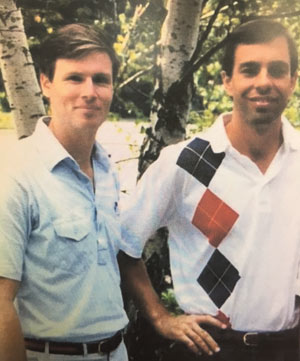
When I first arrived at Echo Lake Country Club 33 years ago, the first friend I made was the golf pro, Mike Preston. We were both young and wanted to make our mark on the golf world, and we rapidly meshed into a team that worked together and understood each other’s business, knowing that through teamwork, we would do a better job of keeping our members happy. Along the way, I picked up some important business lessons from him that I continue to use in running the green department at Echo Lake.
Right: Author Chris Carson (left) and golf pro Mike Preston in their early years at Echo Lake Country Club in Westfield, N.J.
I learned that the term “customer service” has real meaning and consequences, and that understanding what our members want is the key to success. This is true not just in the broad sense of understanding the goals and aspirations of the club, but also in knowing the desires of each member. I learned that it’s important to anticipate members’ needs and to try to give them what they want before they ask. Frequently, the best question you can ask when dealing with a member concern is, “What would you like me to do?”
Public relations are a big part of our pro’s job, and being the face of our club is one of his main responsibilities. I quickly understood that as golf course superintendent, I also had an important role in public relations. I’ve done my best to represent my club professionally at association and golf meetings and get-togethers, and I’ve always understood that even when I’m interacting with members of my community, I am representing the club that pays my salary.
Mike, who recently retired, always wanted to know why things were happening on the course — not just what was happening. He would say that if he knew why we were undertaking a task or project, he could more easily support the green department when members asked him questions. With that in mind, we ate lunch together almost every day.
I have a vivid memory that illustrates this point. A member came up to us to say hello, and although he knew I was the superintendent, he was used to asking questions of Mike, so he asked him why we were aerifying greens. Without missing a beat — and as I continued to enjoy my lunch — Mike proceeded to inform the member why aerification was necessary and how it made the greens stronger and play better, and then the conversation morphed into the member’s golf game. After the member left, it struck me how natural this conversation was and how well my friend supported my work.
It may seem odd to some superintendents to think that we need to be intimately involved with the business side of golf, but we do. For example, I watched Mike welcome outings to our club, keep them happy, address their problems and concerns, give them more than they asked for, and sign them up for next year. Following that lead, the green department does everything we can to ensure that when outings come to our club, they are treated well and perceive great value from their day. Each of these outings provides income to the club, and each deserves our full attention.
Communication issues are usually the cause of problems between superintendents and their club, and I knew early in my career that interconnecting throughout the club would be imperative to success. Mike’s weekly staff meetings helped him organize and inform his staff, and he and I would talk afterward to confirm dates, starting times and specific needs for each event on the calendar. This communication became a natural part of our day, and though the conversations were casual, they were also important. Knowing that the Wednesday Ladies Member-Guest has changed from start times to shotgun, for example, is a way to avoid conflicts and complaints. Issues can be bypassed purely by avoiding surprises.
The most important lesson I learned from my golf pro came from a document that he provided to all of his new assistants during their first day at Echo Lake. The last sentence of the two-page document perfectly sums up the main lesson I’ve learned from Mike: “Members and their guests are not an interference to our work — they are our work!”
I’ve taken this simple declaration to heart, and as I better get to know our new golf professional, Pat Fillian, I try my best to continue a legacy of customer service that has been an integral part of my professional life.
Chris Carson is the GCSAA Class A superintendent at Echo Lake Country Club in Westfield, N.J., where he has worked for 32 years. He teaches courses on budgeting and professional development at the Rutgers Professional Golf Turf Management School. A 32-year member of GCSAA, Chris has served as president of both the GCSA of New Jersey and the New Jersey Turfgrass Association.